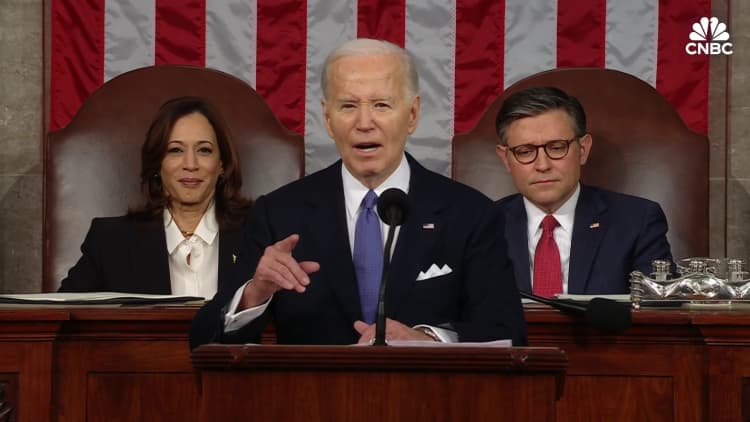
Pixelseffect | E+ | Getty Images
Some grocery store products are providing less for your money. And everyone from President Joe Biden to Cookie Monster has noticed.
Blame shrinkflation. The term — which is increasingly used in conversation — refers to products becoming smaller in size, weight or quantity as their prices stay the same or even increase.
Biden took companies to task for shrinking sports drinks and ice cream cartons and providing fewer chips in snack bags, in a pre-Super Bowl video posted on social media.
At the State of the Union, he again took a stand against shrinkflation, complaining that Snickers bars have become smaller.
Mars, the company that makes Snickers, denies the allegation. “The size of Snickers singles and share bars in the U.S. hasn’t been reduced,” a spokesperson for the company said in a statement.

In a more lighthearted exchange, when Cookie Monster posted “Me hate shrinkflation!” on X earlier this month, the White House responded, “C is for consumers getting ripped off.”
“President Biden is calling on companies to put a stop to shrinkflation,” the White House said.
The president has called for a bill to be passed that would give the Federal Trade Commission the authority to put regulations into effect to curb shrinkflation. The proposal would also make it possible for the FTC and state attorneys general to engage in civil actions against companies that engage in the practice.
Where consumers may see shrinkflation
For now, it’s up to consumers to spot the changes companies may make to their products.
Certain products tend to be more susceptible to charges of shrinkflation, according to Bureau of Labor Statistics data cited in a recent Senate report.
Household paper products had the largest measured price increase change due to shrinkflation from January 2019 to October 2023, with a 10.3% increase.
Other categories that saw notable changes in that time frame include snacks, which increased by 9.8%; household-cleaning products, up 7.3%; coffee, 7.2%; candy and chewing gum and ice cream and related products, 7%.
Noticing the changes requires having a keen eye and diligently paying attention, according to Mara Weinraub, senior lifestyle editor of groceries at food website The Kitchn.
More from Personal Finance:
Why gas is so expensive in California
Credit card users face ‘consequences’ from falling behind
After Biden praises progress on inflation, economists weigh in
It can be easier to track those changes if you typically buy your groceries online or if you belong to a grocery store’s loyalty program. Some families even track their grocery store shopping by hand, Weinraub said.
If you’re watching for changes, you’re more likely to spot when a bag of popcorn shrinks from 5 ounces to 4.5 ounces, she said.
Shrinkflation isn’t necessarily new. But there are reasons why consumers are paying more attention to it now, Weinraub said. Social media makes it easier to share experiences with downsized products. Meanwhile, companies are generally posting profits while engaging in this practice, she said.
“There’s a layer of deception that they feel like, ‘Oh, this is something that companies are trying to do under the radar without us noticing,'” Weinraub said.
Why critics say shrinkflation is the wrong focus
While shrinkflation is now under the political spotlight, not all experts agree the emphasis is correctly placed.
Inflation peaked at 40-year highs in 2022. While the rate of inflation has come down, it is still higher than the Federal Reserve’s target.
The Bureau of Labor Statistics tracks changes in the sizes of consumer products in order to accurately capture the changes in prices for goods and services in the consumer price index.
While consumers may notice shrinkflation at the grocery store, it has a very small impact on the overall inflation picture they face, the Bureau of Labor Statistics said in 2023 article.
Shrinkflation is rarer than politicians are depicting and not as influential on consumers’ lives, argues economist Veronique de Rugy, senior research fellow at the Mercatus Center at George Mason University.
“Ultimately, consumers’ lives are harder because of inflation,” de Rugy said.
Notably, the categories most affected, such as snack products, are areas where consumers may refrain from purchases or substitute other goods, she said.
Most economists are not paying close attention to shrinkflation, contending its effects are eventually absorbed in inflation data.
But “I understand how with the average person it would frustrate and annoy them,” said David Doyle, head of economics at Macquarie.
How to be a smarter shopper at the grocery store
Customers shop at a Costco store on August 31, 2023 in Novato, California.
Justin Sullivan | Getty Images News | Getty Images
While consumers cannot control the changes companies make to grocery store products, they can take steps to be more mindful of how much they are spending.
Switching to a different brand may be one way to save, according to The Kitchn’s Weinraub, particularly by opting for store brands. Many stores are expanding their private label lines, which are generally cheaper than brand names, she said.
Taking the time to do some comparison shopping can also help, Weinraub said.
One staff writer at The Kitchn experimented by shopping in person at the grocery store for one month and then buying exclusively online for another month. She was shocked when she compared her receipts, discovering she spent over twice as much in person, Weinraub said.
Avoiding those in-person impulse purchases may help you save more than you think, she said.
Other shoppers have switched retailers and found that change “literally saved them hundreds of dollars,” Weinraub said.
“These strategies become increasingly important, as the prices continue to either maintain or creep up, or you seem to be getting less for the same amount of money,” she said.
“You do need to get more creative to stretch your dollar further.”
